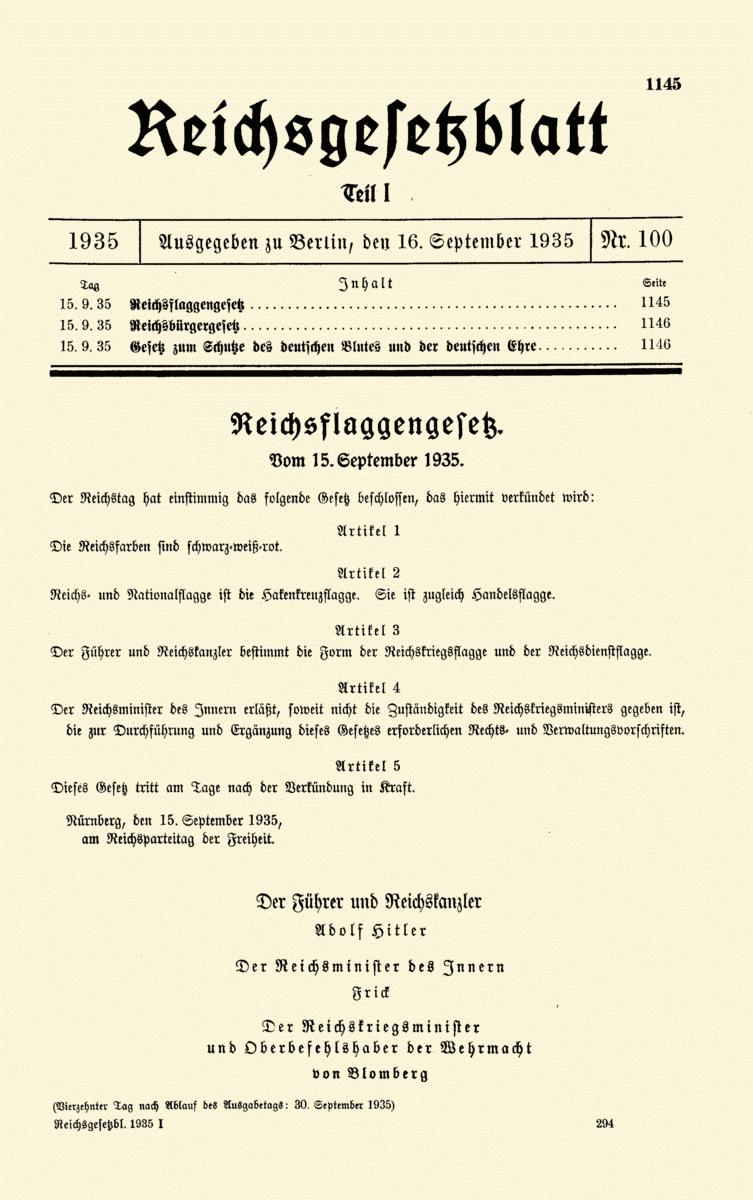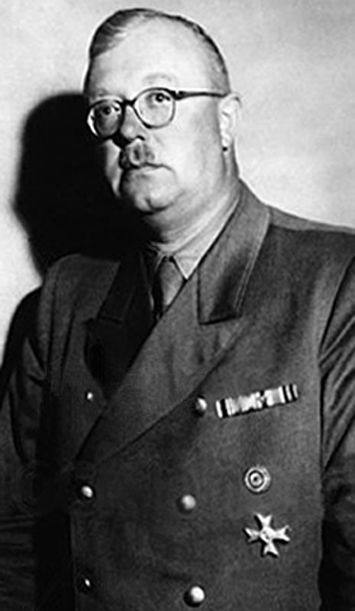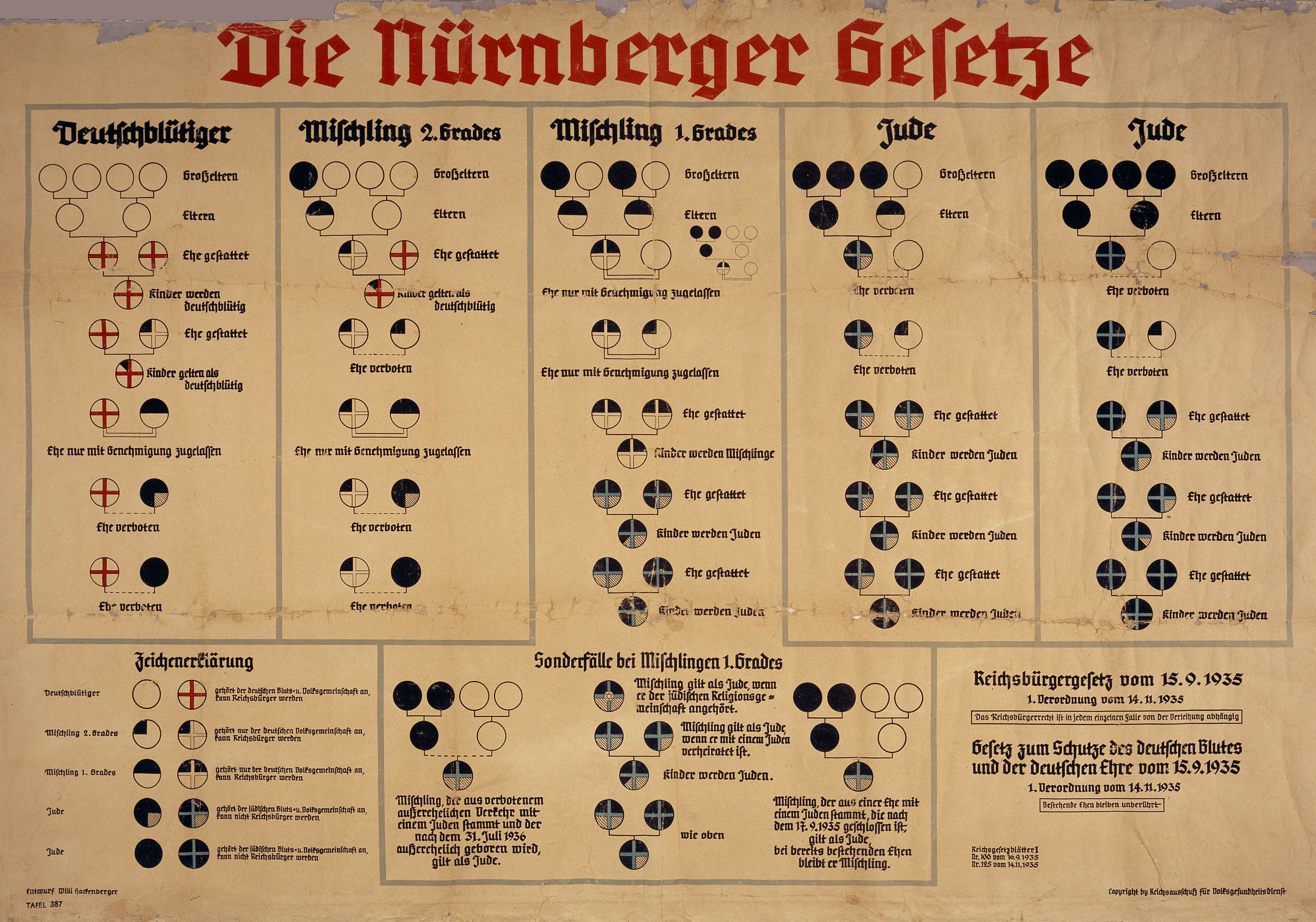|
Bernhard Lösener
Bernhard Lösener (27 December 1890 – 28 August 1952) was a lawyer and Jewish expert in the Reich Ministry of the Interior. Along with Wilhelm Stuckart, he helped draft the Nuremberg Laws, among other legislation that deprived German Jews of their rights and ultimately led to their deportation to concentration camps. In his memoirs, ''Legislating the Holocaust'', Lösener described his discovery of the Rumbula massacre, in which approximately 1,000 recently deported German Jews were transported by train to Rumbula Forest in Riga, Latvia, and there summarily executed along with 25,000 Latvian Jews. Lösener wrote he had not been aware of any orders to execute the German Jews and was disturbed by the executions. He discussed the incident with Stuckart which caused tension between them. Three years later in 1944, according to Lösener's Reich Ministry records, he was arrested for expressing sympathy for the German Jews. Lösener supported the exemption of the ''mischling'', w ... [...More Info...] [...Related Items...] OR: [Wikipedia] [Google] [Baidu] |
Wilhelm Stuckart
Wilhelm Stuckart (16 November 1902 – 15 November 1953) was a German Nazi Party lawyer, official, and a State Secretary in the Reich Interior Ministry during the Nazi era. He was a co-author of the notorious Nuremberg Laws and was a participant in the January 1942 Wannsee Conference, at which the genocidal Final Solution to the Jewish Question was planned. He also served as ''Reichsminister'' of the Interior in the short-lived Flensburg government at the end of the Second World War. Early life Stuckart was born in Wiesbaden, the son of a railway employee. He had a Christian upbringing. Stuckart was active in the far right early on, and joined the Freikorps von Epp in 1919 to resist the French occupation of the Ruhr. In 1922 he started studying law and political economy at the universities of Munich and Frankfurt am Main, and joined the Nazi Party in December that year; he remained a member until the party was banned after the failed putsch of 1923. In order to support hi ... [...More Info...] [...Related Items...] OR: [Wikipedia] [Google] [Baidu] |
Nuremberg Laws
The Nuremberg Laws (german: link=no, Nürnberger Gesetze, ) were antisemitic and racist laws that were enacted in Nazi Germany on 15 September 1935, at a special meeting of the Reichstag convened during the annual Nuremberg Rally of the Nazi Party. The two laws were the Law for the Protection of German Blood and German Honour, which forbade marriages and extramarital intercourse between Jews and Germans and the employment of German females under 45 in Jewish households; and the Reich Citizenship Law, which declared that only those of German or related blood were eligible to be Reich citizens. The remainder were classed as state subjects without any citizenship rights. A supplementary decree outlining the definition of who was Jewish was passed on 14 November, and the Reich Citizenship Law officially came into force on that date. The laws were expanded on 26 November 1935 to include Romani and Black people. This supplementary decree defined Romanis as "enemies of the rac ... [...More Info...] [...Related Items...] OR: [Wikipedia] [Google] [Baidu] |
The Holocaust
The Holocaust, also known as the Shoah, was the genocide of European Jews during World War II. Between 1941 and 1945, Nazi Germany and its collaborators systematically murdered some six million Jews across German-occupied Europe; around two-thirds of Europe's Jewish population. The murders were carried out in pogroms and mass shootings; by a policy of extermination through labor in concentration camps; and in gas chambers and gas vans in German extermination camps, chiefly Auschwitz-Birkenau, Bełżec, Chełmno, Majdanek, Sobibór, and Treblinka in occupied Poland. Germany implemented the persecution in stages. Following Adolf Hitler's appointment as chancellor on 30 January 1933, the regime built a network of concentration camps in Germany for political opponents and those deemed "undesirable", starting with Dachau on 22 March 1933. After the passing of the Enabling Act on 24 March, which gave Hitler dictatorial plenary powers, the government began isolating Je ... [...More Info...] [...Related Items...] OR: [Wikipedia] [Google] [Baidu] |
Karl Schleunes
Karl Albert Schleunes (April 21, 1937 – May 15, 2021) was an American historian of the Holocaust and the German Empire. He was a professor at the University of North Carolina at Greensboro (UNCG). Schleunes obtained his Bachelor in 1959 at Lakeland College (Wisconsin), and his Master's at the University of Minnesota in 1961, where he also received his Ph.D. in 1966. From 1965 to 1971 he taught at the University of Illinois at Chicago. Since then he was at the UNCG. In 1999 he was a guest lecturer at the Kaplan Centre of the University of Cape Town.University of Cape TownKaplan Newsletter, June 2012, No. 18; PDF direct download./ref> Karl Schleunes was born in Kiel, Wisconsin the son of Henry Schleunes (1892–1968) and Adelia Eickoff (1896–1984) of Schleswig. In August 1964, he married Brenda Jean Pursel, founder and artistic director of the Touring Theatre of North Carolina.Touring Theatre of North Carolina Brenda P. Schleunes, Founder and Producing Artistic Director.2016 ... [...More Info...] [...Related Items...] OR: [Wikipedia] [Google] [Baidu] |
Rumbula Massacre
The Rumbula massacre is a collective term for incidents on November 30 and December 8, 1941, in which about 25,000 Jews were murdered in or on the way to Rumbula forest near Riga, Latvia, during the Holocaust. Except for the Babi Yar massacre in Ukraine, this was the biggest two-day Holocaust atrocity until the operation of the death camps. About 24,000 of the victims were Latvian Jews from the Riga Ghetto and approximately 1,000 were German Jews transported to the forest by train. The Rumbula massacre was carried out by the Nazi ''Einsatzgruppe'' A with the help of local collaborators of the Arajs Kommando, with support from other such Latvian auxiliaries. In charge of the operation was Höherer SS und Polizeiführer Friedrich Jeckeln, who had previously overseen similar massacres in Ukraine. Rudolf Lange, who later participated in the Wannsee Conference, also took part in organizing the massacre. Some of the accusations against Latvian Herberts Cukurs are related to the clear ... [...More Info...] [...Related Items...] OR: [Wikipedia] [Google] [Baidu] |
Riga
Riga (; lv, Rīga , liv, Rīgõ) is the capital and largest city of Latvia and is home to 605,802 inhabitants which is a third of Latvia's population. The city lies on the Gulf of Riga at the mouth of the Daugava river where it meets the Baltic Sea. Riga's territory covers and lies above sea level, on a flat and sandy plain. Riga was founded in 1201 and is a former Hanseatic League member. Riga's historical centre is a UNESCO World Heritage Site, noted for its Art Nouveau/Jugendstil architecture and 19th century wooden architecture. Riga was the European Capital of Culture in 2014, along with Umeå in Sweden. Riga hosted the 2006 NATO Summit, the Eurovision Song Contest 2003, the 2006 IIHF Men's World Ice Hockey Championships, 2013 World Women's Curling Championship and the 2021 IIHF World Championship. It is home to the European Union's office of European Regulators for Electronic Communications (BEREC). In 2017, it was named the European Region of Gastronomy. I ... [...More Info...] [...Related Items...] OR: [Wikipedia] [Google] [Baidu] |
Mischling
(; " mix-ling"; plural: ) was a pejorative legal term used in Nazi Germany to denote persons of mixed "Aryan" and non-Aryan, such as Jewish, ancestry as codified in the Nuremberg racial laws of 1935. In German, the word has the general denotation of hybrid, mongrel, or half-breed. Outside its use in official Nazi terminology, the term ''Mischlingskinder'' ("mixed children") was later used to refer to war babies born to non-white soldiers and German mothers in the aftermath of World War II. Nazi definitions of Mischling Since the Nazis were unable to find a racial definition of a "Jew", they instead relied on one's ancestors' religious backgrounds to determine whether someone was of "German or related blood" ("Aryan") or a "Jew" ("non-Aryan"). Thus, the Nuremberg Laws in 1935 defined a "full Jew" (''Istjude'' or ''Volljude'' in Nazi terminology) as a person – regardless of religious affiliation or self-identification – who had at least three grandparents who had been enro ... [...More Info...] [...Related Items...] OR: [Wikipedia] [Google] [Baidu] |
Nuremberg Trials
The Nuremberg trials were held by the Allies of World War II, Allies against representatives of the defeated Nazi Germany, for plotting and carrying out invasions of other countries, and other crimes, in World War II. Between 1939 and 1945, Nazi Germany invaded many countries across Europe, inflicting 27 million deaths in the Soviet Union alone. Proposals for how to punish the defeated Nazi leaders ranged from a show trial (the Soviet Union) to summary executions (the United Kingdom). In mid-1945, France, the Soviet Union, the United Kingdom, and the United States agreed to convene a joint tribunal in Nuremberg, with the Nuremberg Charter as its legal instrument. Between 20 November 1945 and 1 October 1946, the International Military Tribunal (IMT) tried 21 of the most important surviving leaders of Nazi Germany in the political, military, and economic spheres, as well as six German organizations. The purpose of the trial was not just to convict the defendants but also to as ... [...More Info...] [...Related Items...] OR: [Wikipedia] [Google] [Baidu] |
1890 Births
Year 189 ( CLXXXIX) was a common year starting on Wednesday (link will display the full calendar) of the Julian calendar. At the time, it was known as the Year of the Consulship of Silanus and Silanus (or, less frequently, year 942 ''Ab urbe condita''). The denomination 189 for this year has been used since the early medieval period, when the Anno Domini calendar era became the prevalent method in Europe for naming years. Events By place Roman Empire * Plague (possibly smallpox) kills as many as 2,000 people per day in Rome. Farmers are unable to harvest their crops, and food shortages bring riots in the city. China * Liu Bian succeeds Emperor Ling, as Chinese emperor of the Han Dynasty. * Dong Zhuo has Liu Bian deposed, and installs Emperor Xian as emperor. * Two thousand eunuchs in the palace are slaughtered in a violent purge in Luoyang, the capital of Han. By topic Arts and sciences * Galen publishes his ''"Treatise on the various temperaments"'' (aka ''O ... [...More Info...] [...Related Items...] OR: [Wikipedia] [Google] [Baidu] |
1952 Deaths
Year 195 ( CXCV) was a common year starting on Wednesday (link will display the full calendar) of the Julian calendar. At the time, it was known as the Year of the Consulship of Scrapula and Clemens (or, less frequently, year 948 ''Ab urbe condita''). The denomination 195 for this year has been used since the early medieval period, when the Anno Domini calendar era became the prevalent method in Europe for naming years. Events By place Roman Empire * Emperor Septimius Severus has the Roman Senate deify the previous emperor Commodus, in an attempt to gain favor with the family of Marcus Aurelius. * King Vologases V and other eastern princes support the claims of Pescennius Niger. The Roman province of Mesopotamia rises in revolt with Parthian support. Severus marches to Mesopotamia to battle the Parthians. * The Roman province of Syria is divided and the role of Antioch Antioch on the Orontes (; grc-gre, Ἀντιόχεια ἡ ἐπὶ Ὀρόντου, ''Antiókhei ... [...More Info...] [...Related Items...] OR: [Wikipedia] [Google] [Baidu] |
Lawyers In The Nazi Party
A lawyer is a person who Practice of law, practices law. The role of a lawyer varies greatly across different Jurisdiction, legal jurisdictions. A lawyer can be classified as an advocate, attorney at law, attorney, barrister, canonist, canon lawyer, civil law notary, counsel, counselor, solicitor, legal executive, or public servant — with each role having different functions and privileges. Working as a lawyer generally involves the practical application of abstract legal theories and knowledge to solve specific problems. Some lawyers also work primarily in advancing the interests of the law and legal profession. Terminology Different legal jurisdictions have different requirements in the determination of who is recognized as being a lawyer. As a result, the meaning of the term "lawyer" may vary from place to place. Some jurisdictions have two types of lawyers, barrister and solicitors, while others fuse the two. A barrister (also known as an advocate or counselor in some j ... [...More Info...] [...Related Items...] OR: [Wikipedia] [Google] [Baidu] |






